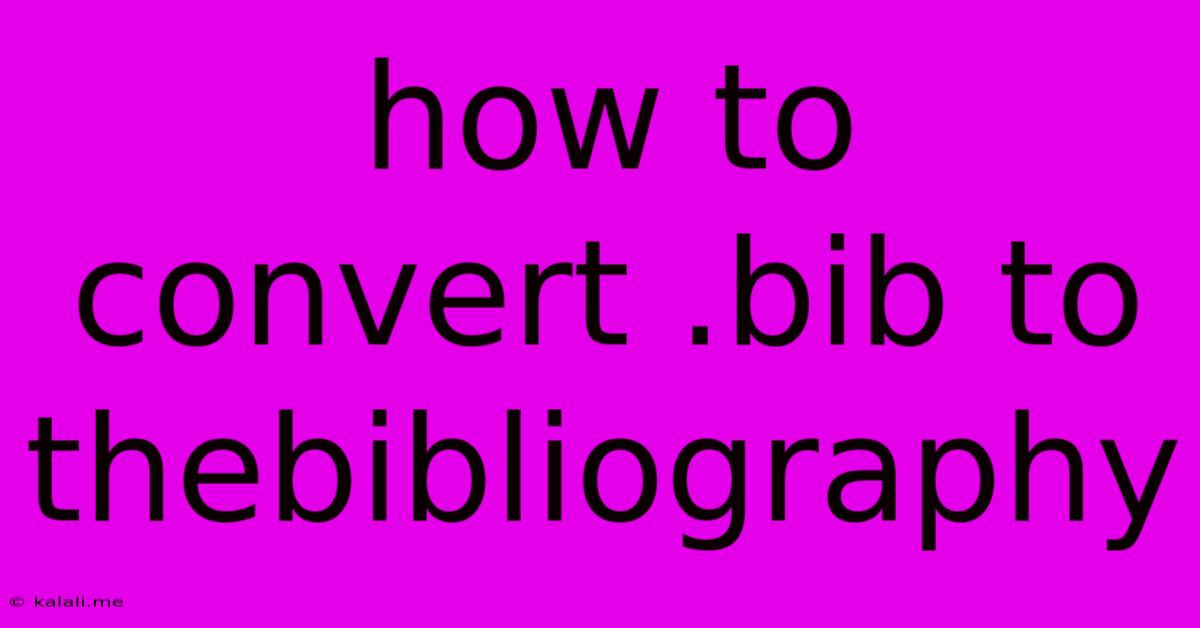How To Convert .bib To Thebibliography
Kalali
May 23, 2025 · 3 min read

Table of Contents
How to Convert .bib to thebibliography: A Comprehensive Guide
Meta Description: Learn how to effortlessly convert your BibTeX (.bib) file into a properly formatted thebibliography environment for your LaTeX document. This guide covers manual methods and efficient tools for a seamless workflow.
Creating a bibliography in LaTeX can seem daunting, but it doesn't have to be. The BibTeX system offers a powerful and efficient way to manage citations, but the final step often involves converting your .bib file into a thebibliography environment that your LaTeX document can understand. This guide outlines several methods to achieve this conversion, from manual processes for smaller projects to automated solutions for larger bibliographies.
Understanding the Process
Before diving into the methods, let's understand the core concept. A .bib file is a database containing bibliographic information in a structured format. LaTeX, through the bibtex utility, processes this information and generates a .bbl file (bibliography file). This .bbl file contains the formatted bibliography in the thebibliography environment. Your main LaTeX document then includes this .bbl file to display the citations and the complete bibliography.
Therefore, "converting" .bib to thebibliography isn't a direct file conversion. Instead, it's a process of using BibTeX to generate the thebibliography environment from the information in your .bib file.
Method 1: The Standard BibTeX Workflow (Recommended)
This is the most efficient and recommended method, especially for larger projects. It leverages the power of BibTeX and avoids potential errors associated with manual manipulation.
-
Create your
.bibfile: This file contains the bibliographic entries for your sources, each following a specific format. You can create this manually or use a citation manager like Zotero or Mendeley to export your references into a.bibfile. -
Include the
\bibliographystylecommand: In your LaTeX document's preamble (before\begin{document}), specify the bibliography style using the\bibliographystyle{}command. Popular styles includeplain,alpha,apalike,acm, and many others. The choice depends on your desired formatting. For example:\bibliographystyle{apalike} -
Include the
\bibliographycommand: After\begin{document}, include the\bibliography{yourbibfile}command, replacingyourbibfilewith the name of your.bibfile (without the.bibextension). -
Compile your LaTeX document: You'll need to compile your document multiple times using a LaTeX editor or the command line. The order typically involves:
- LaTeX (to create the aux file)
- BibTeX (to process the
.bibfile and create the.bblfile) - LaTeX (to incorporate the
.bblfile) - LaTeX (one more compilation to ensure everything is properly updated)
Method 2: Manual Conversion (Not Recommended for Large Bibliographies)
Manually converting a .bib file to thebibliography is extremely time-consuming and error-prone. It's only suitable for very small bibliographies. It involves copying the entries from the .bib file and manually formatting them within the thebibliography environment. This method is not recommended unless you have only a few references.
Method 3: Using Online BibTeX Tools
Several online tools can help format your citations and bibliography. These tools allow you to paste your .bib file and then generate the thebibliography code. However, be cautious and verify the output carefully as some online tools may not handle all aspects of BibTeX perfectly.
Choosing the Right Method
For virtually all projects, the standard BibTeX workflow (Method 1) is the optimal approach. It's efficient, reliable, and prevents errors. Manual conversion should be avoided unless you have a very small number of citations. Online tools can be helpful but require careful verification of the output.
By understanding these methods, you can effectively manage your citations and generate a perfectly formatted bibliography in LaTeX. Remember to choose the method that best suits the size and complexity of your bibliography. Prioritize the BibTeX workflow for a streamlined and efficient process.
Latest Posts
Latest Posts
-
How Many Cups Of Powdered Sugar Is In A Box
May 23, 2025
-
How To Know If Macbook Is Charging
May 23, 2025
-
Resistance To All Damages On Aoe
May 23, 2025
-
Thermal Dynamics Item Duct Not Working
May 23, 2025
-
How Do You Say About In Japanese
May 23, 2025
Related Post
Thank you for visiting our website which covers about How To Convert .bib To Thebibliography . We hope the information provided has been useful to you. Feel free to contact us if you have any questions or need further assistance. See you next time and don't miss to bookmark.